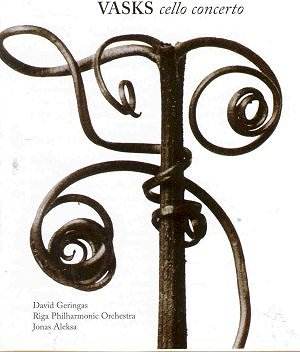.
Here are two half hour
works: one (the Symphony) now recorded
several times over.
The Cello Concerto
was first performed on 26 November
1994 in Berlin with Geringas as soloist.
This work sings and calls amid an icily
unwelcoming world. It is a work of big
statements. I can best liken its ambition
and achievement to parts of the Finzi
Cello Concerto. Geringas has adopted
a hallmark vibrato but it does not detract
here.
Vasks had seen Yuris
Podniecks' film Homeland which,
against the background of the 1990 song
festival ‘For Life and Liberty’, showed
the 368 choirs from Latvia, Lithuania
and Estonia singing songs long banned
by the Soviets. In May 1990 the
streets of Riga echoed with gunfire
as the Soviets wrested control from
the independents. The inclusion in the
film of footage of the struggle was
a factor in shaming the Soviet authorities
to loosen its ramshackle controls. Shostakovich
can be heard in the belligerence of
the toccata I with its braying brass.
It is interesting that in his notes
the composer associates fast music with
destruction and so it is with the heated
blast and unheeding fury of the two
toccata movements. The solo cello is
allowed to sing again in Vasks' natural
language of contemplation and healing
in the finale. There is something here
that sounds like retreat into an interior
world far from hopes changed by brutality
and from the vitriol in balm. This work
now joins the pantheon of great Scandinavian
cello concertos alongside those of Kokkonen
and Sallinen.
The Symphony for Strings
Balsis or Stimmen (Voices)
was written in 1990/91 while the struggle
was at its peak. Starry nights, the
chilly aureole of the moon, wonder and
new-made innocence are all there. This
is to my knowledge the most Sibelian
of his works akin to Sibelius 6 and
Suk's Wenceslas Chorale. Birdsong and
triumph meet, not for the first time
in Vasks works, in the quarter hour
middle movement Voices of Life.
The Voice of Conscience finale
returns to Shostakovich-like exploration
of tragedy. Its searching strong writing
crunches and collides but finally seizes
the healing of prayer and blessing.
It does so not in any narrow religious
sense but in communion with a natural
order of things - renewal in spring;
cleansing in winter.
Good non-technical
notes and superb playing from the Riga
Philharmonic and Geringas.
Rob Barnett
